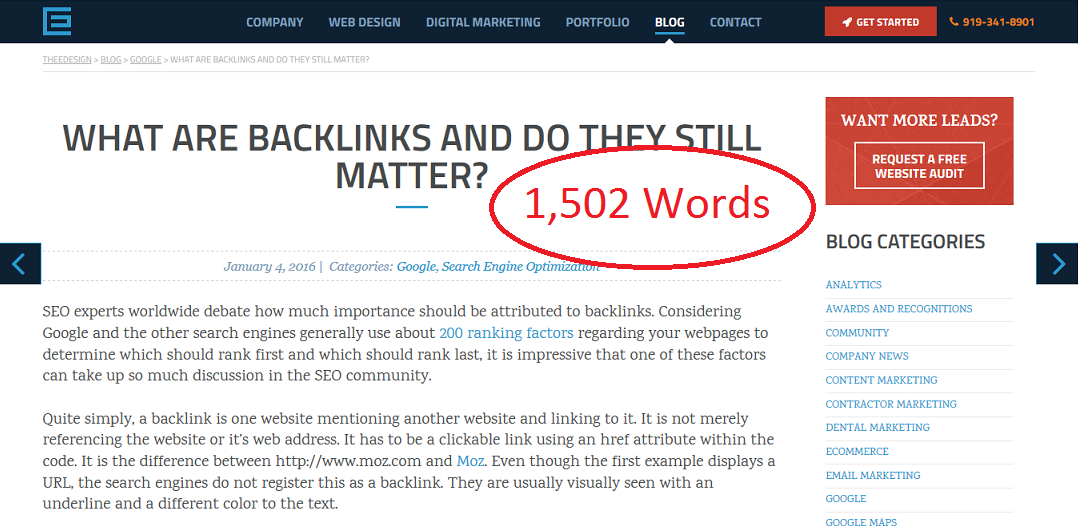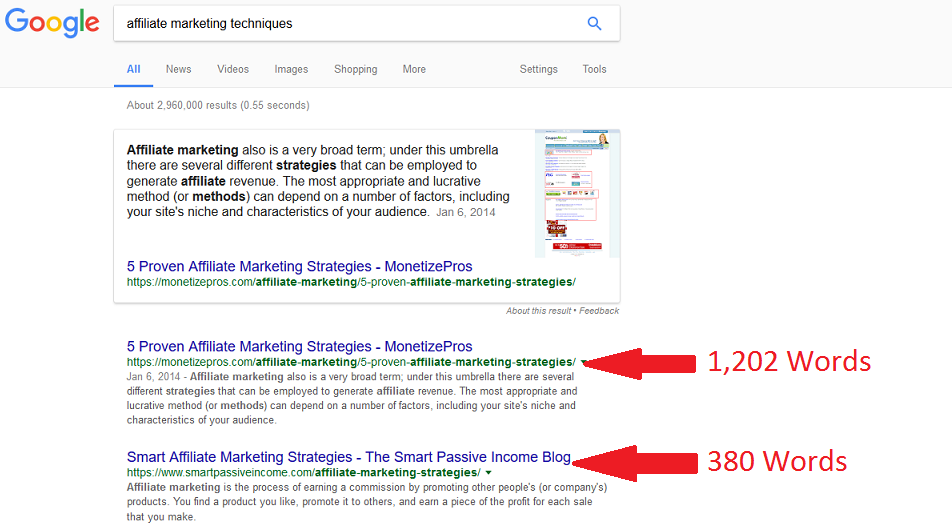Long-Form Content Ranks High, But Short-Form Still Ranks
Long-form content is being touted as one of the best ways to rank higher in search results. However, not everyone agrees. Some SEOs believe that living in a short attention span society means that you must create shorter content to keep people’s attention.
Despite the disagreement, there has been a trend towards using long-form content and a recent study has proven why. It simply ranks higher in search.
The study was published by Backlinko in 2016 and found that the average word count for first page results was 1,890 words. The author theorized that longer content gets more social shares and it provides better topical relevancy for Google.
Regardless of the reason, it was shown that long-form content ranks higher.
To see if the study holds true, I decided to test it for myself. What I found is that long-form content indeed rules the first page of search results. However, I would not recommend ruling out short-form content altogether.
Long-Form Content Dominates, But Short-Form Still Present
The first search I did was for the keyword “what are backlinks?” The first result was from the website, TheeDesign. It was a blog post with a word count of 1,502.

How did the rest fair?
The second result has a little over 1,100 words. However, there were also 100+ comments which shows there has been quite a bit of interaction, another ranking signal which likely helped push it to the top.
Overall, the top five spots averaged a little over 1,000 words per post. Surprisingly, there were two posts of approximately 600 words each. They were both basic definitions of backlinks and a few examples of inbound versus external links.
I tried another example to see if I would get different results.

I used the term “affiliate marketing techniques,” another topic I am doing research on at the moment. I was not surprised by the first result (1,202 words), but astonished by the second (380 words).
How does a 380-word blog post rank #2 in search results? Let’s look at the rest of the top five for that search term.
The average word count was 1,205 (1,412 if you do not factor in the 380-word blog post). Like the first search term I analyzed, this showed long-form content outranked short-form content. However, short-form content still outranked some other long-form content.
If long-form content ranks so well, how is short-form content still ranking high? It all comes down to quality.
Long-Form Is Still About Quality
“Quality content ranks. Quality content that is longer will likely rank higher.”
Unfortunately, some SEO professionals don’t read beyond the first few sentences of new studies. When they heard about long-form content ranking higher, some began creating longer articles without any thought about quality.
Here is the problem.
Long-form content means more than just word count. The rules against keyword stuffing and filler content still apply. Using LSI keywords and providing actionable advice is a must.
When creating longer content, you need to focus on providing information people are searching for. As an example, case studies and guides seem to do very well. People read these types of articles as they contain plenty of examples, something that articles with filler content don’t even come close to.
Long-form content that ranks higher also uses images and video to help demonstrate points and keep the reader’s attention.
The reason pages with longer content rank is not because they are longer, but because people stay on the page longer and increase that page’s session data. If the content does not read well, people will click off faster than a 200 word blog post. You will receive no benefit whatsoever.
So, while long-form content can rank high, short-form will still rank higher if the long-form presented does not provide good quality. Make sense?
Final Thoughts
Long-form content works. You can do your own search like I did above and see for yourself. Just remember that quality is always going to trump quantity which is why short-term content still seems to rank well. However, quantity that is also quality will trump all else.
While the argument of long-form versus short-form content will rage on, I have found that ranking seems to favor quality overall.
My advice is to begin writing and shoot for quality. Write until you have nothing else to say. If you find you have reached the goal of having a long-form content piece, then congratulations. If not, you likely still have a great post. As long as the quality is present, you should still stand a good chance of ranking.
What is your experience with long-form content? Are you more likely to read a shorter or longer post? How has your longer content faired in relation to your shorter content?




